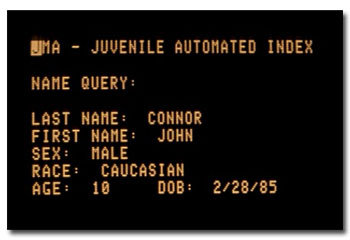5 Movies That Were One Flaw Away From Being Classics

Ever see a movie called Sliding Doors? It was made in the late '90s and starred Gwyneth Paltrow. The point of the film was to show how much a single choice can affect the outcome of your life. The movie wasn't all that great (for example, Gwyneth Paltrow is in it), but the concept is pretty powerful. It's been explored more successfully in movies like Run Lola Run, and makes up about 75% of every Bill Simmons article at ESPN. "What if Portland picked Jordan over Bowie?" "What if Bill Walton wasn't a gimpy towel boy with saltine crackers for feet?" "What if David Tyree didn't catch that football on his helmet why did he catch it WHY GOD WHY OH GOD I HAVE CLIPPERS SEASON TICKETS SHOOT MY FACE WITH GUNS!!!!"
Well, we'll be exploiting the Sliding Doors premise to travel back in time like Dr. Sam Beckett (Long live the Bakula!) and fix some of cinema's most notable blockbusters, satires, even erotic thrillers -- all by changing one simple choice.

When it was released in 1991, most people didn't realize that Terminator 2: Judgment Day was set in 1995, four years in the future. We don't even get a time stamp when Arnold and the T-1000 arrive naked in their respective desolate alley and truck stop.

In fact, the only evidence that the film is set in the '95 is a brief flash of John Connor's police record. So why set your movie in the future and bury that info where nobody (who isn't paid to do this shit for a living) will find it?

Because James Cameron knew what Terminator 2's problem was heading in: John Connor. Since the savior of humanity was conceived in a movie set in 1984, he would only be seven in 1991. Cameron realized that audiences wanted to see a Terminator sequel starring a seven-year-old about as much as they wanted to see a Star Wars prequel starring a seven-year-old.

His way of dealing with this was some ballsy sleight of hand, setting the film in a 1995 that looked exactly like 1991 (which is to say, the most accurate rendering of the future in cinematic history). But he didn't go far enough. He arbitrarily stopped in 1995, giving us a 10-year-old John Connor who, upon repeated viewing, is so obnoxious that you spend most of the movie wanting to see him shot in the face, fate of the world be damned.

Now let's imagine Cameron had moved Judgment Day to the year 2000 and set the film in the waning days of the millennium. Instead of Bart Simpson, we get a 15-year-old John Connor. Casting director Mali Finn never has to fish for a male lead at a Pasadena Boys and Girls club, Edward Furlong never turns into a walking cautionary tale of childhood stardom, and more importantly for our purposes, Cameron never shits up a damn near timeless Terminator with botched attempts at taking the pulse of early '90s youth culture. Instead he would have given us a John Connor who, like his best movie, is too far into the future to touch any cultural touchstones, but still wouldn't have been too distant to listen to a kickass Guns N Roses song.
We can't say who Cameron would have cast had he set T2 four more years into the future, but some pretty intriguing actors were the right age in 1991. Christian Bale was 16 at the time, but if Newsies-era Bale wasn't striking his fancy, he always had the option of Leonardo DiCaprio circa What's Eating Gilbert Grape?. No matter who was cast, he would have saved one of the best action movies of all time from feeling like an obnoxious Nerf commercial.


Both these films are solidly directed gut-punches -- mean-spirited romps written by a young, unproven Quentin Tarantino. True Romance ended up getting filtered through the sensibilities of Tony Scott, the man who brought us such subtle pieces of filmmaking as Top Gun. On Natural Born Killers, Stone twisted Tarantino's sweetly nihilistic story into an anti-media polemic (leading to an angry Tarantino slapping the shit out of one of the producers). Neither was an artistic failure. Great scripts often become good-to-OK movies.

But think about Tarantino's career if he'd directed two of his finest scripts to get optioned. At this point, it's pretty obvious that Tarantino doesn't even make Tarantino movies anymore; he makes Tarantino-flavored mash-ups of other people's films. He's a DJ, not a director -- grabbing an influence here, a camera trick there, a swatch of score, a crane shot. The same way the Bomb Squad built Public Enemy out of 30,000 records and some tape and razor blades, Tarantino builds cinematic experiences out of his vast knowledge of pop culture.

But what if he squeezed two more films into his early era, with the same vibrancy and vision of Pulp Fiction and Reservoir Dogs? You think geeks deify his balding ass now? Imagine a world in which the Academy can't ignore Pulp Fiction for Best Picture because Tarantino's True Romance and Natural Born Killers have already cemented his ascension to Scorsese-level auteur.
As a bonus, Tony Scott doesn't spiral into a career of incoherent try-too-hard ADD action-fests after Quentin spoils him, and Oliver Stone maybe doesn't fall in love with his own psychotically edited navel-gazing bullshit for about another decade and a half. Maybe.

OK, so Shyamalan has had an infuriating career. But the premise of his second film was pretty damned fantastic: Bruce Willis is Superman, but he doesn't know it. Samuel L. Jackson does know it, and in this flick, the "L" stands for "Luthor." The one and only thing keeping this from being a classic was that M. Night Shyamalan was being called the new Spielberg, poised to stomp all over Hollywood. Unfortunately, this put his head six miles up his own ass regarding his storytelling skills. He'd stumbled onto the gritty superhero movie ten years before Christopher Nolan, but he was too blinded by the hype surrounding The Sixth Sense's twist ending to do anything with it. Unbreakable spends most of it's time and energy hiding Willis' superpowers from him, back-loading all the badass potential of the idea into a twist ending.

If Shyamalan realizes what he has and says, "Fuck it, I'm moving the reveal to the middle," he not only keeps himself from falling into the "Twist ending AT ALL COSTS" trap that hobbled his career harder than Annie Wilkes, but he also gives himself an hour to go apeshit in the superhero playground. He gets to beat Nolan to The Dark Knight by almost a full decade. We don't have to wait until his career is in the shitter and he's adapting Nickelodeon cartoons to see him get his action movie rocks off.

The sequels he had planned for Unbreakable actually get made after the film clears $300 million at the box office, sparing us shit like The Village and Ron Howard's Daughter Is Stuck In My Pool: The Movie. And best of all, with the reveal moved up an hour, you get to cut almost every excruciatingly boring scene in which Willis, Robin Wright, and Not-Haley-Joel-Osment stare at each other in a shitty apartment like they were told to pretend they were in a Death Cab video and not a motherfucking superhero movie.
The Devil's Advocate: Cast Anyone Other Than Keanu Reeves.

Keanu Reeves isn't a bad actor, really. He's more like a tool that a director has to use very specifically. If you need a blank -- someone the audience can easily project themselves onto -- you get Keanu and you have him goggle wide-eyed at fantastic things while more "Whoas" fall out of his head than an epileptic Joey Lawrence.

Director Taylor Hackford made the same mistake Francis Coppola made with Dracula, expecting Reeves to stand in the same room as an acting powerhouse (Pacino in Advocate, Gary Oldman in Dracula) and not get blown away like a cotton ball tossed in front of a jet engine. To be fair, Advocate was built almost solely for its last 20 minutes, in which Pacino eats every last inch of the set and shits Oscars. But that scene is preceded by 80 minutes of movie, which an actor with dimensions beside balsa would have enriched greatly.

Brad Pitt, John Cusack, and Edward Norton were all considered for the role of Kevin Lomax. Any one of them could have played the morally tortured lawyer more convincingly, and definitely could have managed something remotely resembling a Southern accent better than Reeves did. How hard is it to pull off a Southern accent? You huff paint, shoot some rotgut bathtub whiskey, and ask yourself what a Larry the Cable Guy fan would sound like. Jean-Claude Van Damme could do a better Southern accent, and he can't even talk.

IMDb explains the casting of Stanley Kubrick's least-regarded film thus: "According to writer Frederic Raphael, the final form of Bill's family name (Harford, as opposed to Scheuer in the original story) was inspired by a debate about Bill's character. Raphael felt Bill should be Jewish as in the original, but Stanley Kubrick insisted Bill and Alice be 'vanilla' Americans, without any details that would arouse any presumptions. Kubrick said that Bill should be a bit like Harrison Ford -- hence the name Harford."

Kubrick made the unfortunate decision to stunt-cast Tom Cruise and his wife Nicole Kidman, well before anyone realized what a horrific idea that was. Of course, the couple weren't so much "vanilla" as they were way more uncomfortable around one another than any married couple should be. According to R Lee Ermey, Kubrick regarded the film as a "piece of shit," and claimed that Cruise and Kidman "had their way with ."
The film wasn't as bad a Kubrick feared, but his concerns do raise the question: Why not go after the guy you're patterning the character after?

You get a better actor who maybe, invigorated after working with Kubrick, doesn't turn into a perpetually stoned stroke victim. Ford probably then ends up taking the lead role in Traffic instead of abandoning it to Michael Douglas, and wins himself an Oscar for it. Any possible future where we're spared Hollywood Homicide is a future worth pursuing.
And Eyes Wide Shut? Han Solo fumbles with his junk at an orgy. Indiana Jones awkwardly hits on a 15-year-old Lelee Sobieski. Jack Ryan starts licking his wife while checking himself out in a mirror. It would have been Harrison Ford as you've never wanted to see him. The most squirmingly uncomfortable thing Kubrick ever put on film -- just like he wanted, but for all the right reasons.
Find out about some other movies that could've been improved upon with 6 Insane Fan Theories That Actually Make Great Movies Better and 5 Awesome Movies Ruined By Last-Minute Changes.
And to further expand your noggin, check out Cracked's De-Textbook: The Stuff You Didn't Know About the Stuff You Thought You Knew.
